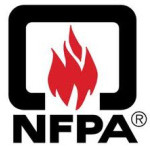- Industry: Fire safety
- Number of terms: 98780
- Number of blossaries: 0
- Company Profile:
Established in 1896, NFPA's mission is to reduce the worldwide burden of fire and other hazards on the quality of life by providing and advocating consensus codes and standards, research, training, and education.
Contents that readily support combustion or that present a physical hazard. For the purposes of this code, this includes Class I, Class II, or Class IIIA liquids that are used or stored in normally closed containers or in closed systems at gauge pressures of less than 15 psi (103 kPa).
Industry:Fire safety
Contents that present a deflagration hazard or a hazard from accelerated burning. For the purposes of this code, this includes Class I, Class II, or Class IIIA liquids that are used or stored in normally open containers or systems, or in closed containers or systems at gauge pressures 15 psi (103 kPa) or greater.
Industry:Fire safety
Contents that are likely to burn with moderate rapidity or to give off a considerable volume of smoke.
Industry:Fire safety
Contents that are likely to burn with moderate rapidity or to give off a considerable volume of smoke.
Industry:Fire safety
Contents of such low combustibility that no self-propagating fire therein can occur.
Industry:Fire safety
Contents of such low combustibility that no self-propagating fire therein can occur.
Industry:Fire safety
Containers that include paper bags, fiber drums, plastic containers, and wooden or fiber boxes or barrels, as well as noncombustible containers having removable combustible liners or packing, and noncombustible containers in combustible overpacks.
Industry:Fire safety
Containers that are closable, puncture-resistant, disposable, and leakproof on the sides and bottom; red in color or display the universal biohazard symbol; and designed to store sharp objects after use.
Industry:Fire safety
